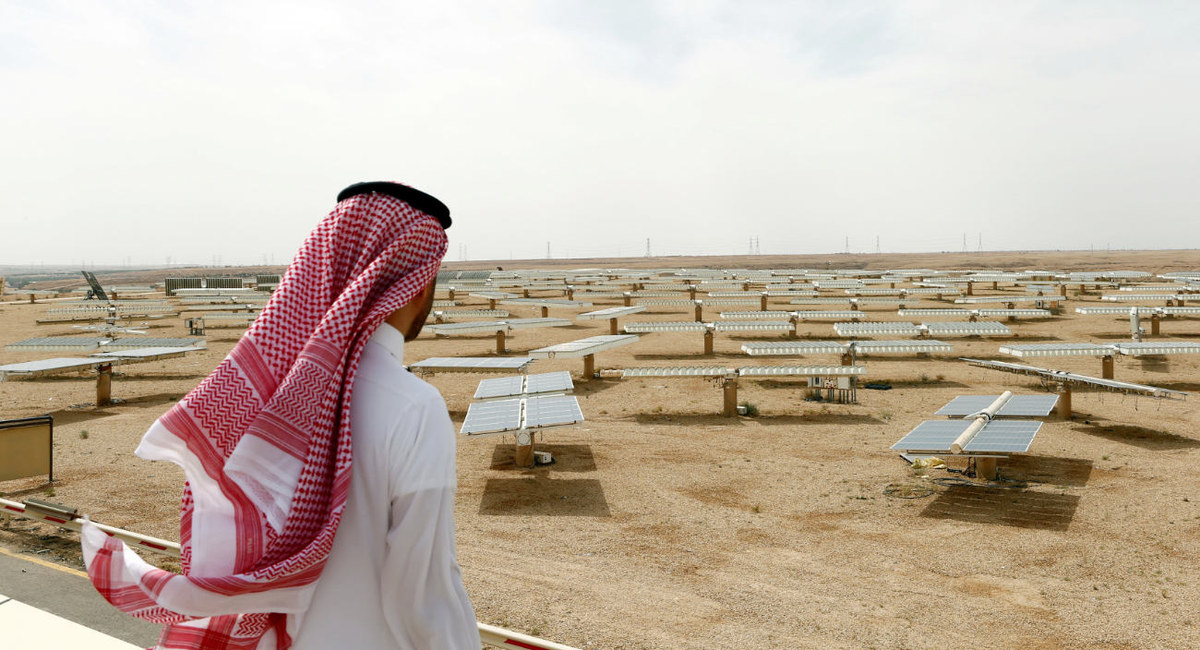
Saudi Arabia gets green light on clean hydrogen
Hydrogen is morphing from a niche power source into a potential front-runner in the green energy revolution — and research shows that Saudi Arabia can become one of the world’s largest suppliers of the gas.
Many experts agree that “green” hydrogen, a carbon-friendly nontoxic gas produced using renewable energy, can play a significant role in achieving a green gas-neutral economy by 2050, helping to combat global warming.
New research by the King Abdullah Petroleum Studies and Research Center (KAPSARC) shows that Saudi Arabia has the resources to become a leader in the nascent “clean hydrogen” market.
According to the International Renewable Energy Agency, the current cost of producing a kilogram of the gas is a little under $5. With an abundance of sunlight, the Kingdom has a competitive advantage in a global commodity market for clean hydrogen that is expected to reach $11 trillion over the next 30 years, according to Bloomberg New Energy Finance (BNEF).
KAPSARC is working with the King Abdullah University of Science and Technology (KAUST) to explore opportunities for Saudi Arabia in clean hydrogen development. Research efforts include large-scale technology deployment, demand markets, infrastructure usage and resource requirements.

The center is conducting a research project on the challenges and opportunities for Saudi Arabia in the future global hydrogen market. As part of this work, Dr. Jan Frederik Braun, a researcher in the climate and environment program, and Rami Shabaneh, a senior research associate in the markets and industrial development program, recently published a commentary that explores the future of clean hydrogen within and beyond the Kingdom.
Braun told Arab News that hydrogen can help to “decarbonize” segments of the energy value chain, such as industrial process heating, heavy-duty and long-haul road transport, aviation and shipping.
“Transport is the third-largest CO2-emitting sector in the Kingdom. Hydrogen produced from renewables-based electricity or natural gas is well-suited to decarbonize parts of the transport sector where fuel cell electric vehicles outperform battery electric vehicles, for example, in terms of shorter charging requirements. This applies to heavy-duty and long-distance transport vehicles like trucks and buses as well as high utilization light-duty vehicles like taxis,” he said.

“In this context, NEOM recently announced a joint venture with Hyzon Motors and Modern Group Plan to supply 10,000 locally built, zero-emission commercial trucks for the GCC markets, of which Saudi Arabia is by far the largest,” he added.
Shabaneh said that estimates of the future role of hydrogen depended on decarbonization policies.
BNEF estimates hydrogen could contribute up to 24 percent of total energy demand if global warming is limited to 1.5 degrees Celsius above pre-industrial levels. By comparison, the Hydrogen Council estimates the gas will make up 18 percent of energy demand if global warming reaches 2 C by 2050. Meanwhile, BP estimates hydrogen to account for 7 percent and 16 percent of total final energy consumption in their rapid and net zero scenarios, respectively.
“It would require comprehensive decarbonization measures, production cost reductions, and scaling up infrastructure and demand for hydrogen to play a significant role as a fuel,” Shabaneh added.
Research efforts are being stepped up to explore how countries such as Saudi Arabia can increase production of clean hydrogen and create comparatively “low-cost, low-risk” markets for CO2-intensive sectors, such as transport.
KAPSARC and KAUST, in cooperation with leading researchers around the world, are looking beyond the Kingdom to analyze how potential importing countries and regions, such as Japan and the EU, are achieving their hydrogen ambitions and what opportunities these hold for Saudi Arabia.
Braun underlined the importance of strategic partnerships with significant importers, such as Germany, in producing, processing, applying and transporting clean hydrogen, including implementing mega-projects such as NEOM.
Saudi Arabia is developing policies and regulatory instruments to drive technologies in hydrogen development to commercial readiness.
“The Kingdom’s hydrogen ambitions could benefit immensely from scaling up production, cooperation, demand and infrastructure through clean hydrogen ‘hubs’ across the GCC. Saudi Arabia has the skills, infrastructure and resources to produce blue and green hydrogen on a large scale,” Braun said.
“Hydrogen is one of many solutions to decarbonize and not the only solution. The scale for local use cases and exports will depend on the economics and the pace of development of the hydrogen economy in regions beyond the Middle East, especially in Europe, North America and Asia.”
“In this way, Saudi Arabia and the other Gulf countries can build economies of scale and pool human, capital and technical resources cost-efficiently,” he added.





























